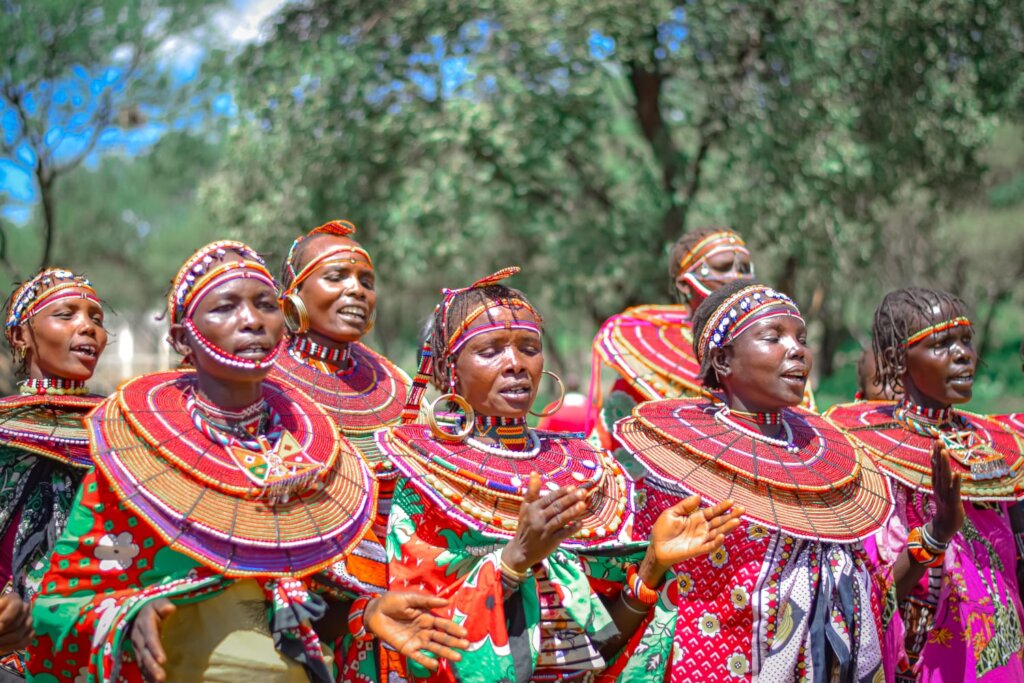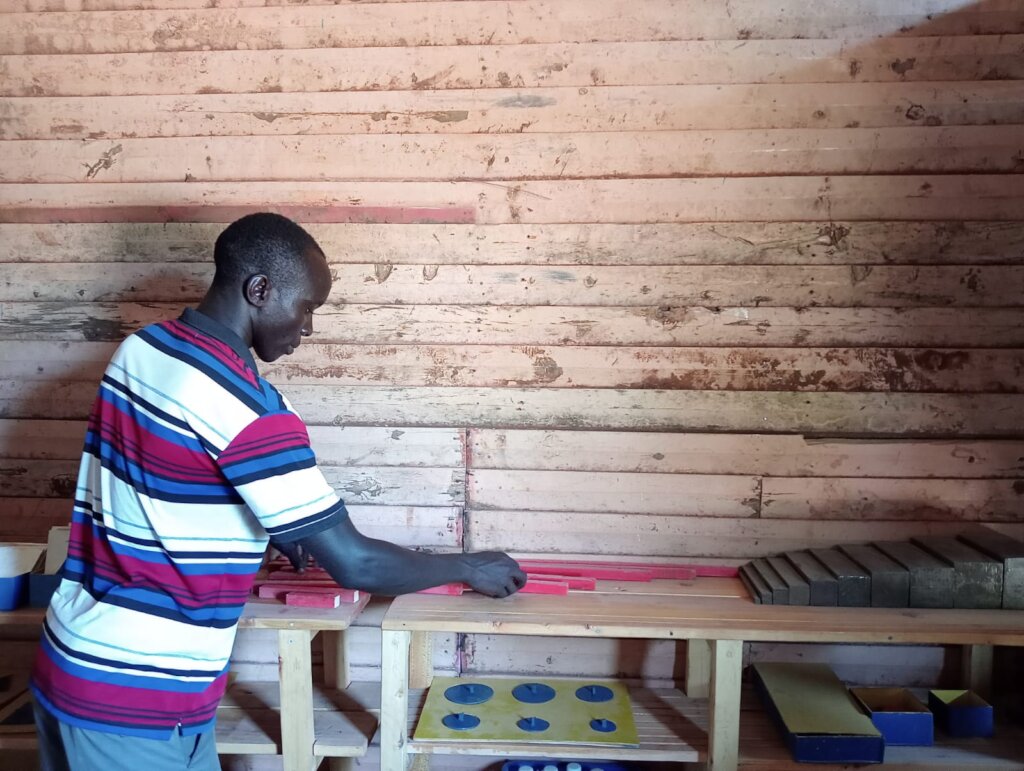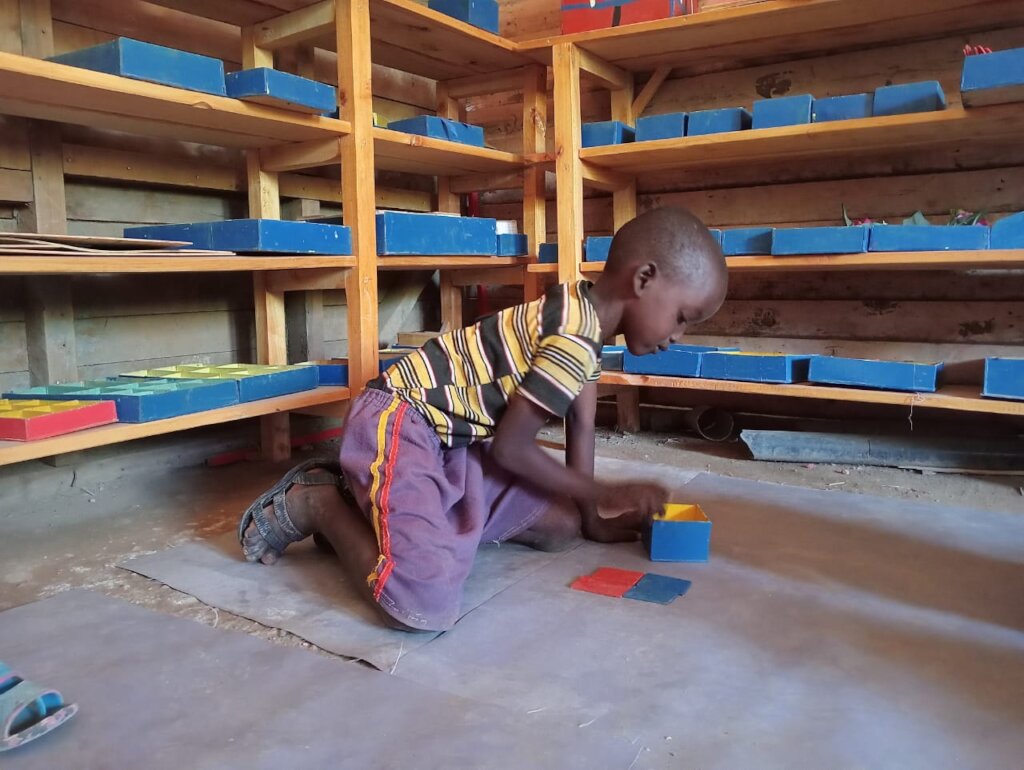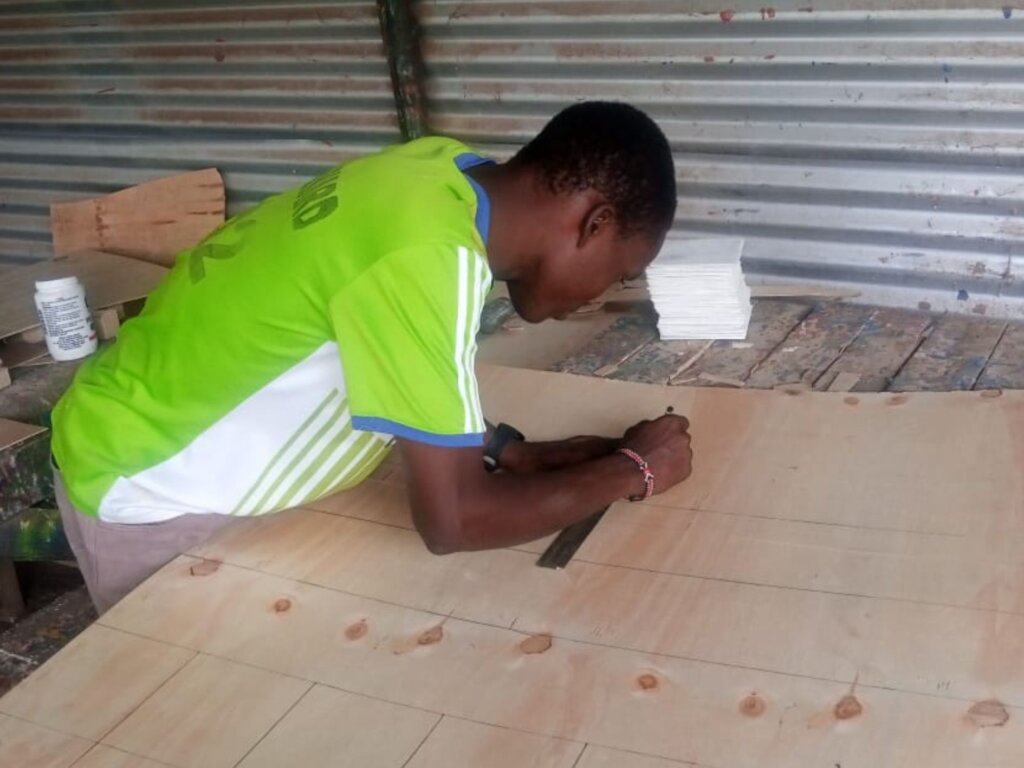By Elske Voermans | EsF Coordinator
Teachers and trainees in East Pokot
The East Pokot initiative started about 2,5 years ago. So far, ten teachers from East Pokot have been supported with their Montessori training:
Denzel, Kemoi and Victor – Module two
Denzel, Kemoi and Victor started the second training module in June, after a brief break. During the break, they went to their families in East Pokot and supported the planting of crops, taking advantage of the long-awaited rains. Rivers came to life once again and the landscape turned very green. Denzel shared that they hope to grow enough crops to feed their families for a few months. Most households still rely on food provided by aid organisations and the trainees are happy that they can use part of their allowance to support their families.
The trainees just completed the module on culture and have now started with the language module. They put a lot of effort into making materials and work neatly and precisely, as they see how the materials can really support children in their development. They proudly share that they are well on track in making their materials and other trainees are often interested in learning from them. David shares;
“The materials are so precious; I cannot wait to show it to the children in our local school. I am so thrilled that what we make really helps the children to think for themselves while solving a problem”.
David hopes to work in the school near his home, so that the children in his community can benefit from his knowledge.
Victor, who is the only child in his family that went to school, shares that he would like to be a role model for the other young people in his community. During the short break, he met the youth in his church to talk with them and encourage them to pursue an education. He says that teaching young children is traditionally seen as a job for women, but the interactions he has had with his peers have changed their perspective and many of them expressed interest in Montessori training. The training helped Victor to realise that a good foundation is very important for the development of children and their opportunities later in life. He plans to continue to bring awareness to his community about the importance of education, where many children still do not go to school.
The trainees have also done a one-week observation as part of their training. Denzel did observation at the Corner of Hope Montessori school in Nakuru and shares: “When I entered the school, it hit me that I was looking at the practical implementation of what we had learned in the college.” He observed that the children worked independently and needed little guidance from the teacher. “I was very excited to see a Montessori classroom. It was neat and beautiful, the materials were displayed in a very organised manner and the calm and patient teachers made the children feel at ease”.
Montessori environments in Pokot
Nasaltuko
The four trainees in their second year who are now in teaching practice are doing well. Sharon and Danson work with 80 children in Nasaltuko in a temporary church structure. Sharon says that the children love working with the materials: “After we presented the different activities to them, they have not missed a day of school. We also talk with the parents about the importance of education, which has helped to keep the children coming to school every day”.
Despite the many young children, Nasaltuko village did not have a school. The local priest who was involved in the set-up of the first Montessori classrooms in Pokot became determined to establish a Montessori school in the village. Funds have been collected and a new school building will be ready in a few months. Danson is very happy with the support they get from the priest and those who donated to the school building. “It can be challenging to work with so many children in the temporary structure. There is not enough space to display all the materials and we also work outside in the shade to create more space for the children. We make it work, but we look forward to moving into the new school building”.
Chesakam
Julius is working at a government school called Chesakam, with over 45 children in his classroom. He shares that the biggest challenge is that children often miss school. This is a common challenge in East Pokot, mainly caused by the long droughts which force parents to move as well as a lack of school lunches and insecurity in the region. He shares that despite the challenges, he is passionate about his work. He was asked to help the other teachers in the afternoon. He loves to engage the older children with practical activities. He says that the children love working with their hands and he tries to think of activities for them in a creative way, making use of what is available to them.
Barpello
Maureen, who completed her certificate training in November 2022, now supports Gladys, who is doing her teaching practice in Barpello. Maureen shares that the children are working independently and the parents are very happy with the change in behaviour they observe in their children. The parents say that their children are very independent and they are surprised by all the tasks they perform at home. Some parents have requested for their children to be transferred to the Montessori classroom which they see as the best education.
Tangulbei
Evelyne and Linet are responsible for the two 3-6 classrooms at St. Luke’s school in Tangulbei. They set up their first Montessori environment 1,5 years ago. The community and parents are embracing Montessori education, which has resulted in an increase in enrollment of children. Both teachers are doing well and are becoming more confident every day. As Linet is currently on maternity leave, Evelyne is supported by Benjamin Kago, a Montessori teacher from Corner of Hope.
All teachers are supported by mentor teacher Gladys Lokolia, who is from East Pokot. She is currently doing the 3-6 International AMI Montessori Training in Tanzania to further develop her mentorship skills. The teachers are also regularly visited by experienced teachers from Corner of Hope and Montessori for Kenya conducts monitoring visits. These visits help the teachers to deepen their understanding of Montessori principles and reflect on their skills. The teachers also go through the environments with the mentors to look at the condition of the materials and receive what they need to repair and maintain their materials which helps them to keep their Montessori environments tidy and complete.
The teachers are very happy with the progress they observe in the children and see a better future for the Pokot children. They hope that there will be more trained Montessori teachers to reach out to all children and schools in East Pokot in the future.
Project reports on GlobalGiving are posted directly to globalgiving.org by Project Leaders as they are completed, generally every 3-4 months. To protect the integrity of these documents, GlobalGiving does not alter them; therefore you may find some language or formatting issues.
If you donate to this project or have donated to this project, you can receive an email when this project posts a report. You can also subscribe for reports without donating.
Support this important cause by creating a personalized fundraising page.
Start a Fundraiser


